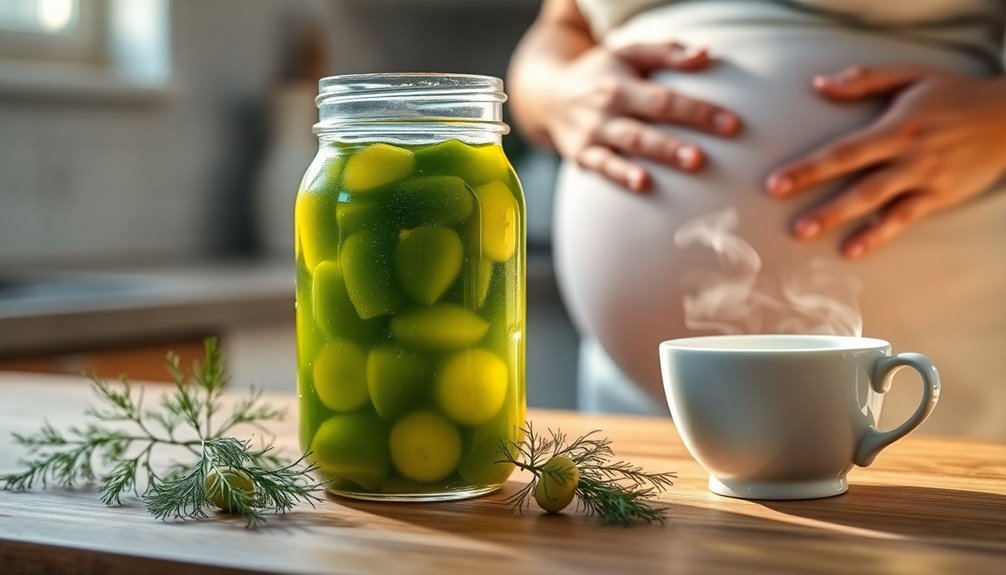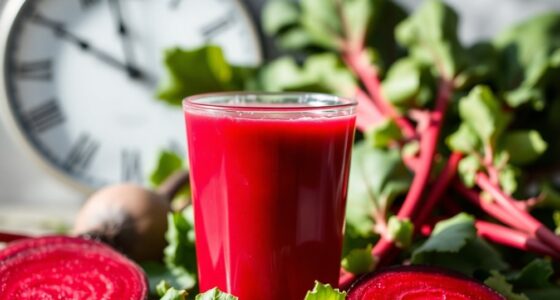Yes, pickle juice can help with nausea during pregnancy. Its high sodium content may balance electrolytes, providing relief for some women. However, everyone's reaction is different, so it's important to listen to your body. Diluting pickle juice with water can also make it easier on your stomach. Always talk to your healthcare provider before trying new remedies. There are other strategies you can explore to manage nausea effectively.
Key Takeaways
- Pickle juice may relieve nausea during pregnancy due to its high sodium content, which helps balance electrolytes.
- Diluting pickle juice with water can reduce acidity and make it easier on the stomach.
- Individual reactions to pickle juice can vary, so moderation is important to avoid excessive salt intake.
- Fresh ginger and small, frequent meals are alternative remedies that can also help with nausea.
- Consulting a healthcare provider is essential before trying pickle juice or any new remedy during pregnancy.

If you're struggling with nausea during pregnancy, you might be surprised to learn that pickle juice could offer some relief. Many pregnant women experience nausea associated with morning sickness, and while there's no one-size-fits-all remedy, pickle juice is among the options some find effective. The high sodium content in pickle juice can help balance electrolytes, which may ease your nausea. However, moderation is crucial; too much salt can lead to other health issues, especially during pregnancy.
You may wonder how you can incorporate pickle juice into your routine safely. Diluting it with water can be a good strategy, especially since the acidity of pickle juice might worsen nausea for some women. By mixing it, you can enjoy the potential benefits without overwhelming your stomach.
It's also worth noting that anecdotal evidence suggests many women find relief from morning sickness symptoms after consuming pickles or pickle juice. However, reactions can vary widely, so it's essential to pay attention to your body's signals.
In addition to pickle juice, you might also want to explore other remedies. Fresh ginger, for instance, is another popular natural option known for its anti-nausea properties. You could try ginger tea or even ginger candies to help soothe your stomach.
Alongside these remedies, focusing on eating small meals throughout the day can also be beneficial. Instead of three large meals, consider having five or six smaller ones to keep your energy levels stable and minimize nausea. Opting for comfort foods that settle well in your stomach, like bland crackers or rice, can also make a difference.
While some pregnant women find relief from nausea through pickle juice, it's always a good idea to consult with a healthcare provider before incorporating it into your diet as a remedy. They can provide personalized advice based on your specific health needs and ensure you're making safe choices for you and your baby.
Remember that every pregnancy is unique, and what works for one person may not work for another. If you do decide to try pickle juice, keep in mind that store-bought varieties are generally safer than homemade options due to the risk of Listeria. Always prioritize your health and safety, especially when it comes to food during pregnancy.
You're navigating a special time in your life, and finding relief from nausea is important. While pickle juice may not be the ultimate solution for everyone, it's worth considering as part of a broader strategy that includes other remedies and dietary adjustments. Your journey through pregnancy can be challenging, but with the right support and information, you can find ways to manage nausea and enjoy this exciting time.
Frequently Asked Questions
Are Pickles Good for Nausea During Pregnancy?
Pickles can be good for nausea during pregnancy, especially if you enjoy their crunchy texture and salty flavor.
Many pregnant women crave pickles, which might hint at their potential benefits for nausea relief.
However, it's essential to consume them in moderation due to their high sodium content.
Always opt for store-bought pickles prepared in vinegar to ensure safety and avoid any harmful bacteria.
Listen to your body and adjust your intake accordingly!
What Juice Is Good for Nausea During Pregnancy?
Did you know that around 70-80% of pregnant women experience nausea? To combat this, consider trying ginger juice, which is renowned for its anti-nausea properties.
You might also find relief with lemon juice or peppermint juice, both known for their soothing effects. Coconut water keeps you hydrated and is gentle on your stomach.
Fresh fruit juices like apple or pear can also provide hydration without triggering nausea. Give them a shot!
How Can I Stop Nausea During Pregnancy Asap?
To stop nausea during pregnancy ASAP, try staying hydrated with water or electrolyte drinks.
Eating small, frequent meals can stabilize your blood sugar and help reduce nausea. Incorporate anti-nausea foods like ginger or lemon, and opt for bland snacks like crackers.
Practicing deep breathing or relaxation techniques can also ease stress-induced nausea.
If nausea persists, consult your healthcare provider for safe medications or supplements that can provide additional relief.
Will Pickle Juice Help Nausea?
If you're wondering whether pickle juice can help with nausea, it might be worth a try.
Some people find relief from its acidity and saltiness, which can balance electrolytes and soothe an upset stomach.
However, be cautious about its high sodium content, as too much can lead to water retention or other issues.
Mixing it with water can make it easier on your stomach.
Always consult your healthcare provider before trying new remedies.
Conclusion
So, if you’re feeling queasy during your pregnancy, don’t hesitate to give pickle juice a shot. Just like a medieval knight reaching for a trusty sword, it might be just the remedy you need. The tangy flavor can help settle your stomach while providing electrolytes. Of course, always check with your healthcare provider first, but embracing this unconventional solution could make your pregnancy journey a little smoother. Cheers to feeling better! Additionally, if you find that the pickle juice isn’t quite doing the trick, you might consider other natural remedies to help ease nausea. For new parents, it’s also essential to know how much prune juice for babies can be safely introduced to assist with digestion. Remember, each pregnancy and baby is different, so staying informed and consulting with your healthcare provider can ensure the best outcomes for both you and your little one.
Cindy thoroughly researches juicing trends, techniques, and recipes to provide readers with practical advice and inspiration. Her writing style is accessible, engaging, and designed to make complex concepts easy to understand. Cindy’s dedication to promoting the advantages of juicing shines through her work, empowering readers to make positive changes in their lives through the simple act of juicing.











